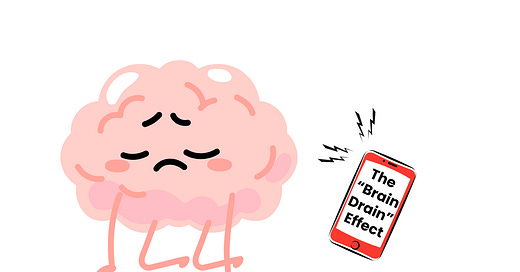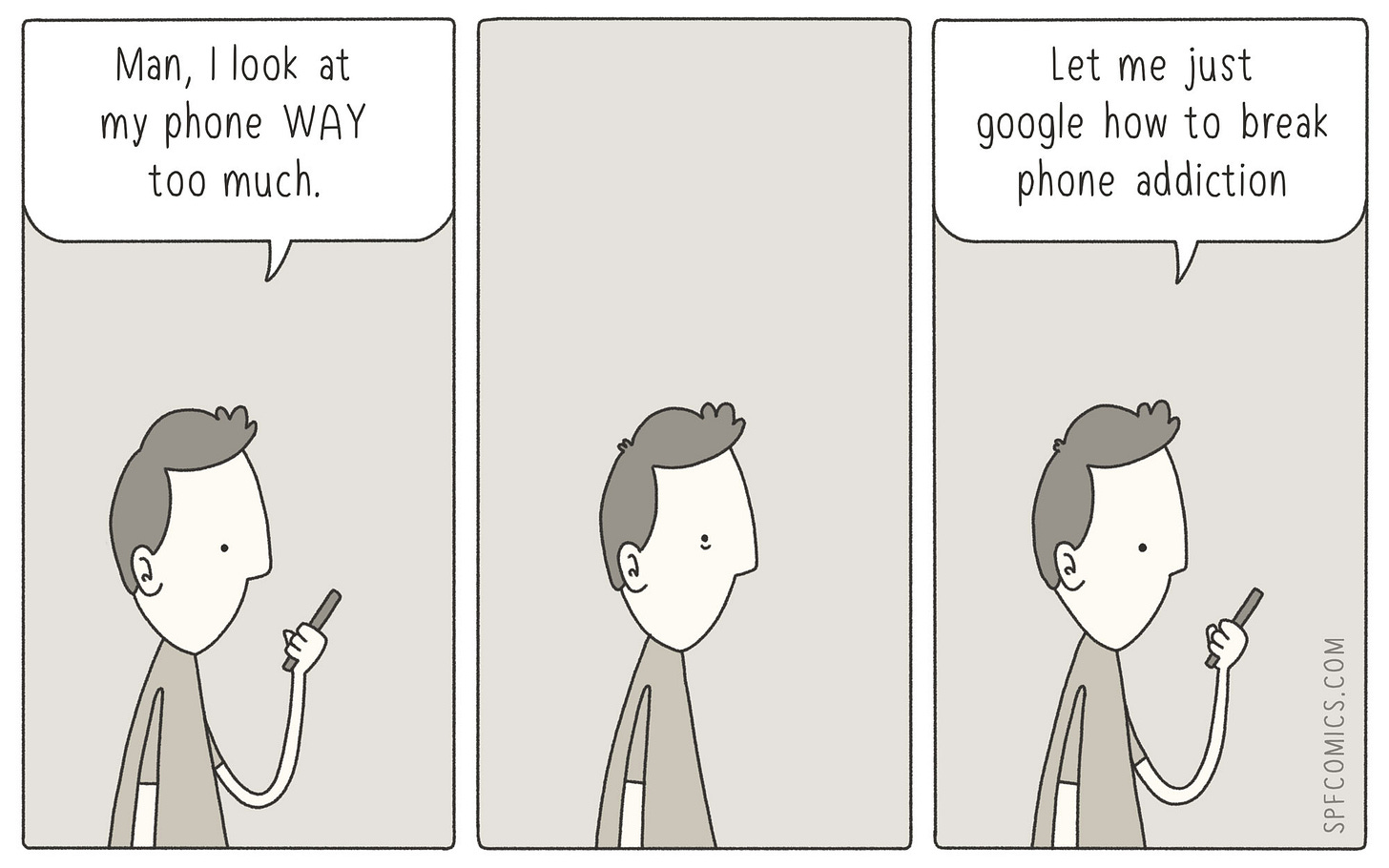Why putting our phone away isn’t enough: The "Brain Drain" effect
The hidden cognitive cost of keeping our phone close and what we can do about it.
📝 Words: 671 | 🕰️ Estimated Reading time: about 4 mins
Smartphones connect us to the world in ways that were unimaginable just a decade ago.
We check the weather from bed, we buy stocks - and gossip - while stuck in traffic, browse potential romantic partners between appointments, make online purchases while standing in-store, and live-stream each others’ experiences, in real time.
The average American checks their smartphone 144 times per day.
However, this constant connection comes at a cost.
You probably know some of the most common issues:
Yes, the picture does not look good. But I managed to reduce my screen time by a lot - you might say.
You used all the known and unknown tricks in the book: turning it upside down, silencing it1, deleting the most used social media apps, activating grayscale mode2, switching it off.
You name it.
I was successful in reducing my screen time as well, and I was very happy with the results. But then I found this paper:
What happens when smartphones are not in use, but merely present nearby?
What the paper says 🔬
The "brain drain" hypothesis suggests that just having our smartphone nearby can use up some of our mental resources, leaving us with less ability to focus on other tasks.
Just having our smartphone nearby - even if we’re not using it - can take up some of our mental energy 🤯
Our brain is wired to automatically pay attention to things that are important or frequently relevant to us, like our smartphones.
So, when our phones are nearby - especially in our line of sight - our brains have to work extra hard to ignore them, which leaves us with less brainpower for other tasks.

The mere presence of smartphones can negatively affect two measures of cognitive capacity (i.e. available working memory capacity3 and functional fluid intelligence4).
In the experiments, people who were engaged with ongoing cognitive tasks were able to keep their phones not just out of their hands, but also out of their (conscious) minds (i.e. they did not think about them while performing tasks) - however, the mere presence of these devices left fewer attentional resources available for engaging with the task at hand.
Additionally, this "brain drain" effect was founded to be stronger for people who are more dependent on their smartphones. Those who rely on their phones the most, experience the greatest cognitive costs from their presence.
Read here about the effect of banning smartphones from schools.
How to reduce “brain drain” effect 🧠☁️
The experiments in the paper shows that intuitive “fixes” such as placing one’s phone face down or turning it off do not work. The paper suggests instead one simple solution: separation.
The best way to reduce “brain drain” is to create some distance between you and your phone.
Conscious and protected (i.e. no sound or vibration) separation, may allow people to perform better not just by reducing interruptions, but also by increasing available cognitive capacity.
So, after cutting down on how much you use your phone, try taking it a step further. When you need to focus (e.g. on a presentation, on a Excel model, on a sales pitch), put your phone out of sight and out of reach.
It might sound like a small change, but our mind will definitely thank us.
Here’s what you might also like from Getting Better:
However, according to a Penn State study, silencing smartphones leads to more frequent phone-checking, especially in people with high FOMO (fear of missing out).
“Working memory capacity” (WMC) reflects the availability of attentional resources, which serve the “central executive” function of controlling and regulating cognitive processes across domains.
“Fluid intelligence” (Gf) represents the ability to reason and solve novel problems, independent of any contributions from acquired skills and knowledge stored in “crystallized intelligence”.






Okay, here's a post script from someone who agrees completely, and is a certified family caregiver by the US Dept of Veteran Affairs. (I've never put that in print like this before)
My husband is a 100% disability US combat veteran, and we sleep in different rooms so he maintaines a semblance of independence.
In order for me to allow myself to deep sleep, he agrees to call me so I can come and assist his toileting, etc. He loves saying 'Hey Google" and has his own voice-activated "valet," as he says.
That also means in the day, I can write, virtually coach, network, engage in a Mastermind, or read and comment on wonderful posts like this knowing that he can and will call when he needs my assistance.
I'm 75, an entrepreneur and a technology immigrant, who embraces and rejoices at the positive impact this smartphone has to my cognitive ability,
Before he and I lovingly set that protocol, I was unsure I could physically or emotionally go on.
Thank you for allowing me to share my truth here, G!
This makes sense. If you create friction it’s harder to complete that sequence and with us inherently wanting things to be as easy as possible, keeping your phone out of reach could be a smart move 👀